Elizabeth Spann Craig's Blog, page 150
September 1, 2013
Help With Dialogue Tags
Guest Post by Jack Smith
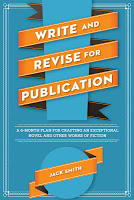
Dialogue
Tags
What about “he said”/”she said”—do you
need them? Or perhaps the character’s
name instead of the pronoun? How much of
either is needed? How much is too
much? Like everything else in creative
writing, no rules here. Only what
works. And you can think of this matter
in at least two ways: clarity and style—or both.
Take a look at this passage from Raymond
Carver’s “What’s in Alaska?” Do we need
the dialogue tags?
“I don’t know. Something Mary said,” Helen said.
“What did I say?” Mary
said.
“I can’t remember,”
Helen said.
“We have to go,” Jack
said.
“So long,” Carl
said. “Take it easy.”
We could probably use some help here,
clarity-wise, since we’ve got four characters speaking, but notice too that
Carver creates an interesting cadence by the repetition of “said.” Really!
Nice, isn’t it? What if he went
by some silly hard-and-fast rule about cutting down your use of “said.” We would miss the lyrical quality of his
prose. Wouldn’t we?
Is clarity a matter in this passage from
Carver’s “The Compartment”?
They love you, I said.
No, they don’t, he
said.
I said, Someday,
they’ll understand things.
Maybe Wes, said. But it won’t matter then.
You don’t know, I
said.
I know a few things,
Wes said, and he looked at me.
Clarity is much less an issue here. But again—notice how the repetitive use of
“said” builds an interesting cadence. The texture of the prose draws us in—or
at least it draws me in.
Notice now this passage from Hemingway’s The Sun Also Rises. No dialogue tags:
“He must drink a lot
of wine.”
“Or wear purple
undershirts.”
“Let’s ask him.”
“No. He’s too tired.”
There’s plenty of this bare-bones
dialogue in this novel. And by now, this
stripped-down dialogue is pretty familiar to many readers—readers, for
instance, of Cormac McCarthy. It creates
an impact. We hear conversation spoken,
and that’s it—like an audio tape.
But there’s a middle road—a “he said,” a “she
said,” or “Norm said,” or “Mary said,” now and then—and then an action line
that establishes who’s talking. For
instance, also from The Sun Also Rises:
“Poor old
darling.” She stroked my head.
You could avoid the tags by action lines
like this. We know who’s talking.
So what are your options?
1.
Ramp up the dialogue tags.
2. Eliminate them altogether and go with
the bare-bones back and forth exchange.
3. Insert action lines now and then to
find ways to avoid tags.
But don’t get the idea that it’s best to
go for the Aristotelian Mean and take a middle path. Think clarity, but also think style.
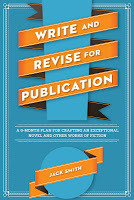 What sound do you want to create? What tone?
What sound do you want to create? What tone? Jack Smith
Write and Revise for Publication
, Writer’s Digest, 2013, and Hog to Hog, winner of the George
Garrett Fiction Prize, Texas Review Press, 2008
Published on September 01, 2013 21:01
August 31, 2013
Twitterific
by Elizabeth S. Craig, @elizabethscraig
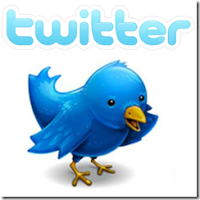
Twitterific
links are fed into the Writer’s
Knowledge Base search engine (developed by
writer and software engineer Mike Fleming) which has over 23,000 free articles
on writing related topics. It's the search engine for writers.
Sign up for our free newsletter for bimonthly writing tips and interviews with top
contributors to the WKB or like us on Facebook.
Mike Fleming and writing coach James Scott Bell are
offering an online, interactive, writing program to help make your next novel
great. It's called "Knockout Novel" and you can learn more about it
at Knockout Novel.com.
8 online writing communities: http://dld.bz/cMUCn @SMisDynamite
Business of Screenwriting: The Niceties –
Manners Matter: http://dld.bz/cNcF3
@scriptmag
Seven Deadly Sins Of Novel Writing: http://dld.bz/cNcFC @angelaackerman
Scene and Sequel: http://dld.bz/cNnJS @Wix
5 Reasons Perseverance is the Most
Important Quality for a Writer: http://dld.bz/cNf35
@Woollz
"It's all about pre-orders these
days," says agent Kristin Nelson. http://dld.bz/cNJby
@Porter_Anderson
Tips for Authors on Amazon: http://dld.bz/cNnKU @tonyeldridge
7 Hemingway quotes on writing: http://dld.bz/cNf3V @InkTanked
Donald Wollheim and the Ace Double Novel:
http://dld.bz/cMUCB @KirkusReviews
3 Reasons You Shouldn't Sweat Email
Unsubscribes: http://dld.bz/cN2hx
@copyblogger
Swapping in Writing: http://dld.bz/cN2h6
Should Authors Post Negative Reviews? http://dld.bz/cN2h9 @MsBessieBell
5 Top Reasons to Live "The Artist's
Way": http://dld.bz/cN2hA
@charmaineclancy
"Yes, I'm An English Major. No, I
Will Not Be Working At McDonald's." http://dld.bz/cN2hB
@HeyThereFuture @ThoughtCatalog
11 Essential Books to Be a Better Online
Writer: http://dld.bz/cN2hE @rogercunard
@kaleidico
Thinking and Marketing a Novel Outside
the Box: http://dld.bz/cN2hF @Riduna
Carbohydrates for Writers: Finding
Creative Fuel: http://dld.bz/cN2hH @YAHighway
The "Why" of Mysteries and the
issue of Immortality: http://dld.bz/cN2hP
@swkehoe
How A Few Tricks Can Keep the Momentum
Going on That New WIP: http://dld.bz/cN2hS
@cleemckenzie
Tips for interacting with agents at
conferences: http://dld.bz/cNNkn @JennyBent
@Porter_Anderson
What Are Amazon's Weaknesses? http://dld.bz/cN2hT @arhomberg
4 Signs That Your Manuscript Isn't Ready:
http://dld.bz/cN2jr @ava_jae
Query Letter: There's Disagreeing and
There's Being Unwise: http://dld.bz/cN2js
@behlerpublish
The Unexpected Agony of Recording Your
Own Audiobook: http://dld.bz/cN5ED
@theatlantic @katiehafner
3 Sentences Most Overused by Beginning
Writers: http://dld.bz/cN5EQ @ventgalleries
10 Daily Rituals Of Brilliant and
Successful Creators - http://dld.bz/cN5ES
5 Ways to Keep Your Writing Sharp: http://dld.bz/cN5F5 @KristinaLudwig1
7 Most Common Misconceptions About
Science Fiction Publishing: http://dld.bz/cN5FJ
@io9
In defense of 'bad' writers: http://dld.bz/cN5FM @TobarWriter
9 Reasons to Keep A Reading Journal: http://dld.bz/cN5FU @DollyGarland
KDP Quality Notices: http://dld.bz/cN7Y4 @marla_ann
6 Things 1 Writer Learned from Charles
Bukowski: http://dld.bz/cN7Y5 @jaltucher
@thoughtcatalog
Mapping a writer's brain: http://dld.bz/cN7YM @joycedyer2010 @NYTimes
A creative's work is never done, and what
it means for us: http://dld.bz/cN7YR @tannerc
What Makes A Better Writer – Deliberate
Practice or Writing for a Purpose? http://dld.bz/cN7YW
@DollyGarland
An editor addresses gender disparity in
the bylines at the @nybooks : http://dld.bz/cN7Zj
@alexnazaryan
Writing life: Chunks vs. bites: http://dld.bz/cN7Zt @apalanca
How to Trick Yourself into Writing: http://dld.bz/cN7ZH @emarianaranjo
8 Practical Tips for a Better
Relationship with a Writer: http://dld.bz/cN7ZM
@_mohul
What's My Character Motivation? – At the
Root of It All: http://dld.bz/cN8ad
@scriptmag
10 Things Emerging Writers Need To Learn:
http://dld.bz/cN8ax @mpnye
Accurately Representing Your Novel: http://dld.bz/cN8b5 @tipsylit
3 short story lessons from Graham Greene:
http://dld.bz/cN8bG @icess
11 tips for editing your own writing: http://dld.bz/cN8dg @rebeccaberto
5 literary movements that shook the
world: http://dld.bz/cN8dn @InkTanked
To Blurb or Not to Blurb? http://dld.bz/cN8dR @JLDelbourgo
40 Books for Every Writer's Library: http://dld.bz/cN8dV
Writing Short Stories - Worth the Time? http://dld.bz/cN8dX @h_mccoubrey
A Brief Tutorial on Fanfiction: http://dld.bz/cN8eb @thealiasjones
A minister attends writing classes to
learn how to deliver sermons that won't be boring: http://dld.bz/cN8eu
Introduction to SFF – Pulp: http://dld.bz/cN8ez @AmazingStories0
Five Rules of Writing: http://dld.bz/cN8eB @sleepybard
How Not to Write a Superhero Novel: http://dld.bz/cN8eH @mixerpublishing
10 Basic Writing Tips:
Writing Your Way Through Depression: http://dld.bz/cN8f9 @cateartios @christybis
How to Create Layers of Thematically
Pertinent Conflict: http://dld.bz/cN8fT
@storyfix @KMWeiland
Successful Schmoozing with Agents at
Conferences: http://dld.bz/cN8gs @jennybent
13 ways to be a better writer: http://dld.bz/cN8gw @rebeccatdickson
On Staying Motivated: http://dld.bz/cN8g4 @BlueMesaReview
How Does An Author Adjust His or Her
Approach from Novel to Novel? http://dld.bz/cN8gW
@vgrefer
The Book Marketing Maze: 22 Wrong Turns
And How To Avoid Them: http://dld.bz/cNA8p
@JonathanGunson
5 Places to Find Critique Partners: http://dld.bz/cNA9z @ava_jae
A Book Trailer for Structuring Your
Novel: http://dld.bz/cNA93 @KMWeiland
A character therapist answers writers'
questions on guilt and Intermittent Explosive Disorder: http://dld.bz/cNA9D @jeanniecampbell
A character development exercise: http://dld.bz/cNAAp @SCBWI_BI
The Most Serious Screenwriting Mistakes: http://dld.bz/cNAAv
5 Tips for Writing a Memoir: http://dld.bz/cNAA6 @Writers_Write
An analysis of diversity in children's
books: http://dld.bz/cNADc @4everYA
Action/Thriller Writing: The DIE HARD
Method: http://dld.bz/cNADK
'Twilight Zone' Creator Rod Serling
Shares Great Screenwriting Insight in Final Interview: http://dld.bz/cNAFX @nofilmschool
Setting the Tone with Style: http://dld.bz/cNFz7
The Puritan Work Ethic and Writing with
Passion: http://dld.bz/cNFzE @ShanJeniah
Tips for covering your self-pubbed book: http://dld.bz/cNFzJ @aimeelsalter
A scam affecting freelance writers: http://dld.bz/cNFzZ
Writers behaving badly: http://dld.bz/cNF6m @kemiogunniyi
Some advice: Don't read this article, but
do go write something: http://dld.bz/cNF6s
@31Plays31Days
An analysis of "A History of
Violence": http://dld.bz/cNFCK
@thescriptlab
The Documentary Screenplay: http://dld.bz/cNGAd
1 Simple Way To Resolve Plot Issues In
Your Novel: http://dld.bz/cNGAh @vgrefer
More Tips 1 Writer Learned From Her
Editors: http://dld.bz/cNGSA @lkblackburne
5 Ways to Write a Killer Plot Twist: http://dld.bz/cNNgr @KMWeiland
To Improve Your Writing, Stand Outside of
It: 7 Tips: http://dld.bz/cNNgH
@RobBiesenbach
Character Differentiation: http://dld.bz/cNNgV @ajkandathil
Let Your Characters "Say
Everything" – Writers & Analysts: http://dld.bz/cNNgZ
@coachkiki
On Keeping a Notebook: http://dld.bz/cNNhm @SarahNumber4 @parisreview
4 Books That Every Young Writer Should
Read: http://dld.bz/cNNhr @hamiltoneliz
@PolicyMic
Finish What You Started: How To End Your
Story: http://dld.bz/cNNhx @btmargins
10 Remarkable Posthumously Published
Novels: http://dld.bz/cNNh2 @mashable
How 1 writer has learned to write faster:
http://dld.bz/cNNhC @GuyHaley
15 Writers and Their Bedrooms: http://dld.bz/cNNhF @Writers_Write
Writing A Novel Proposal: Author
Background: http://dld.bz/cNNhS
@NovelRetreatsAu
A Story is a Story. Write It. http://dld.bz/cNNje
What NOT to do when Writing: http://dld.bz/cNNjp @stefanvucak
Why The iPhone Is Causing Problems For
Screenwriters: http://dld.bz/cNNju
@BuzzFeedEnt
Structure of Pulp Fiction: Method in the
Madness: http://dld.bz/cNNj2 @TheScriptLab
6 Public Speaking Tips From Ashton
Kutcher: http://dld.bz/cNNjB @RobBiesenbach
What Netflix Taught 1 Writer About
Character Development: http://dld.bz/cNNjJ
@pshares
Writing Advice From Joyce Carol Oats
& Stephen King: http://dld.bz/cNNjP
@woodwardkaren
Creating Tension: http://dld.bz/cNNjW @RebeccaLuElla
The Writing Tools of 20 Famous Authors: http://dld.bz/cNNka @flavorwire
A ghostwriter on being a 'writer for
hire': http://dld.bz/cNRdm
On Work, Creativity & Protecting Your
Delusions: http://dld.bz/cNRds
@cynthialindeman
The tell-all memoir 1 writer decided not
to tell: http://dld.bz/cNRdH @deprangy @salon
Writing Tips: 25 Rules For Keeping It
Short And Snappy: http://dld.bz/cNRdR
@huffingtonpost
Writing Memoirs--What to Leave in – And
Take Out: http://dld.bz/cNRdX @emmabrockes
Meanest Feedback for Writers–a Worst Ten
List: http://dld.bz/cNRe5
5 things 1 writer learned as a YA debut
author: http://dld.bz/cNRe9 @TheClassof2K13
This Is Your Writing On Drugs: http://dld.bz/cNReK @kenyonreview
Why You Should Write in a Closet: http://dld.bz/cNRf6 @donaldmiller
Writing A Novel Proposal: Outline: http://dld.bz/cNRfA @NovelRetreatsAu
Hard writing makes easy reading: http://dld.bz/cNRfY @annwrite @rebeccaberto
Turning our notes into a novel: http://dld.bz/cNTa7 @nownovel
Tips for giving feedback: http://dld.bz/cNTaC @flyingknuckle
Why 1 writer is glad her 1st book is an
anthology: http://dld.bz/cNTaT @junglereds
@sarahw
Reuse and Recycle Your Words: http://dld.bz/cNTba @WordsmithStudio @JenJChow
Social Reading: The OFF Button: http://dld.bz/cNTuk @Porter_Anderson
After self-editing, find someone else to
look over your manuscript: http://dld.bz/cNTbr
@digitaldeborah
A Writer's Voice: What It Is And How To
Develop Yours: http://dld.bz/cNTb2
@woodwardkaren
Avoid Trashing a Book Online: http://dld.bz/cNTb6 @Tamela_Murray
@stevelaubeagent
What sucks and what's great about letting
go of the novel you've been working on for 2.5 years: http://dld.bz/cNTbC @lucas_klauss
Talking about your character: hands: http://dld.bz/cNTbK @nownovel
List Of Literary One Hit Wonders: http://dld.bz/cNTbS @huffingtonpost
Should fans of YA instead read books
written for their own age group? http://dld.bz/cNKzN
@catagator @Porter_Anderson
Pursuing Intellectual Rigor In Fiction: http://dld.bz/cNTbU @mycropht
Be a renaissance writer: http://dld.bz/cNTcb @matadornetwork
@joshywashington
"I didn't think it would
happen...but then it did." One writer takes a break from writing: http://dld.bz/cNTgW @CassieCook2
Writing Companions: http://dld.bz/cNThb @vanessab73
Writer's Block: AKA, The Seventh Circle
of Hell: http://dld.bz/cNThe @twoodwriter
A Writer's Rules, A Writer's Tools: http://dld.bz/cNTkk @scriptmag @KDelin
Cross-Training for Writers: http://dld.bz/cNTkr @PStoltey @KatValdezWriter
Tips for Writing a Successful Review: http://dld.bz/cNTkH @parajunkee
Synopses: Love the Burn: http://dld.bz/cNTmz @AMBuxton
The Geeky Kings & Queens of Comedy
Writing: http://dld.bz/cNTm5
YA Authors Speak Out About Clichés: http://dld.bz/cNTm8 @lvoisin
What Good Memoir Can Teach You About Good
Copywriting: http://dld.bz/cNTmA @jeffgoins
Tips for accessing your creativity: http://dld.bz/cNTnkThe Alphabet in Crime
Fiction: Dangerous Undercover Operations: http://dld.bz/cNAtX
@mkinberg
What does social reading mean for the
future of books? http://dld.bz/cNR4q @Porter_Anderson
@damiengwalter @brianoleary
What to do when you get a bad review: http://dld.bz/cNTmY @enthom72
Published on August 31, 2013 21:01
August 29, 2013
A Productivity Note
By Elizabeth S. Craig, @elizabethscraig

This post will be short and sweet
because…I’ve gotten a little behind with everything this week. :) And the odd thing is that this is back to
school week, so you’d think I’d be getting tons
of stuff done.
But no.
And yesterday, I had to sit down and assess where I was going wrong. Why
was I scrambling to finish up writing-related tasks like promo? Why was supper a last-minute effort? Why did
I keep forgetting milk at the store?
What on earth was different?
Well, what was different was that the
kids were back in school. But it’s not
quite the same as last year.
Last year…all the years, actually…I’ve
driven my son’s carpool to school and back.
I sat in the carpool line and typed half of my word goal each day in
that line. And now—my son is driving
himself to school.
I’m still driving my daughter’s carpool,
but not every afternoon. That school
lets out later than my son’s school, too.
So my schedule changed and that
messed me up.
Another place where I went wrong—in the
afternoons, I felt so lost by not heading off to the high school to sit in the
carpool line that each day this week I asked myself, “What should I be doing
right now?”
And the answer each time was: “I have no
idea. Maybe I should check my email.”
Wrong!
Checking email is never the right
answer to that question. :) Email is a tremendous time-suck for me.
What I did instead yesterday was to make
a list of what I needed to do. I’d made
a list in the morning, but I’d checked those things off. What I need now, apparently, is a separate
afternoon list. So I wrote it up. The most pressing things were to proofread a
teaser chapter that I was on deadline for, find and schedule links for Twitter,
and then pull that laundry out of the dryer before the stuff started wrinkling
(there’s not a lot of ironing going on in my house). Checking email was not on this list.
So, for me anyway, even small
fluctuations in a schedule have an impact. If I lose productivity, then I need
to figure out where I’m going wrong.
And lists…one list may not be enough to
carry me through a whole day. Because
when I finish the stuff on my morning list—heck, I might just pull up my emails
and lose an hour or more.
Do you ever have to reassess when to fit
your writing in? And do you rely on
lists as much as I do?
Published on August 29, 2013 21:01
August 27, 2013
Writing and Taxes

by Elizabeth S. Craig, @elizabethscraig
The business side of writing is my least
favorite part. I struggle to keep
up. And there’s sort of a residual guilt
that I’m not doing all I can do to keep my accounts organized. But I’m trying.
New as of 2013 is an accountant. I tried…I did try…to do my taxes last
February. I’ve done my own taxes for the last ten years. This time, however, they boggled my mind
about halfway through and I also felt a rising panic that I was doing something
wrong. I found a CPA right away.
One of the problems is that my
income—never very much, but always nice to have and increasingly relied upon—comes from many
different sources. I’ve now got income
coming from two traditional publishers, Amazon, Smashwords, Nook, ACX, and
CreateSpace. My accountant recently
asked me financial planning questions. I ended up giving
several apologetic shrugs. I’m sure this
makes her want to drink heavily.
“So you’re getting a check this
fall? But you don’t know what that check
will be for?” She smiles patiently at
me.
“No idea.
It’s for royalties from Penguin.”
“For sales. But you don’t know your sales.”
“That’s right. It’s just sort of a surprise.” I’m blushing now. It makes it look as if I’m not paying
attention. But these are numbers I’m not privy to—primarily bookstore
numbers. This is, admittedly, one of the things that drives writers a little nuts when it comes to traditional publishing. I add, “But I also have
self-published books and I’m paid 60 days in arrears for those. I should be able to give you an idea of the
money coming in 60 days from now for my self-pubbed books, if that helps.” Financial planning, when you're a writer, means a lot of guesswork and piecing together.
I did get some tips from the CPA that
I’ve been fairly good about following (and then some that are good tips that I
haven’t gotten around to yet).
Open a
business checking account. If you
can, find a free one—probably with a small bank or a credit union. Have your publishing income direct deposited
into that account. Write checks for
publishing-related expenses from that account, too—it just helps to keep
everything straight.
Keep a
small notebook in your car to record gas expenses for writing-related trips.
This is not only for promo…this could be gas spent driving to the post office
to mail off giveaway prizes to readers or gas used driving to the bank to
deposit a random check.
For US writers (since I have no idea how
this applies to international writers)—if you know you’ll likely be paying a
fair amount of taxes to the federal government in April (because this stuff
isn’t taken out of our checks, y’all), we should pay
the government estimated, taxes along the way. To avoid penalties, for sure, but also to
keep the tax bill from putting us in total shock when we get it in April.
Contributing
to a 401K (self-employed people can be eligible) or an Individual Retirement Account can help to reduce the
amount of taxes we pay.
Obviously, the necessity of paying taxes
means that we shouldn’t spend all of the money
from the checks that come in. As difficult as this is. :)
If your income is higher during the year
than you’d previously estimated, it might be a good idea to check back in with your accountant and make some
plans.
Keep
receipts. Keep your office supply
receipts, your receipts for computer-related purchases, your gas receipts, your
conference receipts. Remember to keep
receipts of payments for services, too—your agent’s commissions, your cover
designer’s bill, your formatter’s invoice, etc.
And the disclaimer…clearly, I’m not a tax adviser (ha!) If you need tax advice…I do recommend you find a
professional. It will keep you from
staying up at night worrying about this stuff.
Until you find your professional, here
are some interesting articles on taxes and writing income to get a more
thorough overview.
Taxes 101 for Authors—by Susan
Spann
10
ways to cut costs from your freelance writing business—by Michelle V.
Rafter
Taxes
and Record Keeping for Writers—by Starla Criser
How do you keep track of your writing
income? Got any other tips?
Image: MorgueFile: ModernCog
Published on August 27, 2013 21:01
August 25, 2013
How many drafts until you’re done?
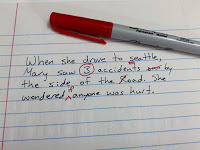
by Elizabeth S. Craig, @elizabethscraig
I think when writers ask how many drafts
another writer completes for a finished story, they’re really wondering whether
they’re spending too much time editing or too little time editing.
That’s what happens when you work
alone—you have no basis of comparison.
I got this question emailed to me
recently and I had to really think about it.
What comprises a draft to me? In
general, how many times do I go through the manuscript before I send it to my
editor?
I definitely keep going through it if I
keep finding mistakes. Obviously, if you
think it’s not a clean document, you want to keep working on it. And I continue reading through the manuscript
if I feel I could have used better diction or if I think of other ways to
improve the story. But there does get to
be a point where a writer is making changes just for the sake of making
changes. You can write the life out of
your story and when it’s tough to say if a change makes the story better or
worse…it’s probably time to either put it aside for a while or send it out on
submission.
What comprises a draft? To me, it’s a new version of the manuscript
with significant changes. A draft is
something, to me, that would make me want to send an updated copy to my editor or
beta reader (“No, read this one,
actually. Not the one I sent you.”)
I’d say that I have probably four or five
drafts of a story before I turn it in.
That’s mainly because I write in layers and the second draft is where I
put in the book’s character and setting description and the third is where I
stick in chapter breaks. Then I have another couple of read-throughs for
errors, pacing, continuity, etc.
You can also approach it a different
way—a bunch of targeted mini-drafts.
This could take more read-throughs, but each time you’d be looking for
specific things: weak scenes, conflict/tension, description that pops,
out-of-sequence storyline, grammar, etc.
After I’m done, I’ll email the story to my editor. Months later, there will be more
editing. Then it goes to the
proofreader…and even more editing ensues.
How many drafts do you usually go through
on a manuscript? How do you know when
it’s ready?
Image: MorgueFile: jppi
Published on August 25, 2013 21:01
August 24, 2013
Twitterific
by Elizabeth S. Craig, @elizabethscraig

Twitterific
links are fed into the Writer’s
Knowledge Base search engine (developed by
writer and software engineer Mike Fleming) which has over 23,000 free articles
on writing related topics. It's the search engine for writers.
Sign up for our free newsletter for bimonthly writing tips and interviews with top
contributors to the WKB or like us on Facebook.
Mike Fleming and writing coach James Scott Bell are
offering an online, interactive, writing program to help make your next novel
great. It's called "Knockout Novel" and you can learn more about it
at Knockout Novel.com.
Amazon adds author new book e-mails: http://dld.bz/cMRrb @BufoCalvin
Arming Your Characters with a Strong
Point of View: http://dld.bz/cMRrd @scriptmag
@brettwean
Should You Ever Redeem Your Bad Guys? http://dld.bz/cMRre @KMWeiland
On subtext: http://dld.bz/cMRrj
@junglereds
The Importance of Output: Could You Be
Doing More? http://dld.bz/cMRrt @jodyhedlund
What to Remember When Attending a Writing
Conference: http://dld.bz/cMRr3
Starting out as a freelancer: http://dld.bz/cMRrG @jbdzyne_camping
Plotting, Pantsing, and Knowing When To
Let Go: http://dld.bz/cMRrM @kalongshore
@martinaaboone
Likeable characters need a bit of
weakness: http://dld.bz/cMRrP @swan_tower
The move from writing textbooks to
writing fiction: http://dld.bz/cMRss
@womenwriters @1snailview
Blind Spots and Obsessions in Historical
Fiction: What Were They Thinking? http://dld.bz/cMRtP
Fiction vs. Reality: http://dld.bz/cMRtU @juliekibler
The importance of being interruptible: http://dld.bz/cMRuf @jeffgoins
Why Watching TV Can Actually Be Good For
a Writer: http://dld.bz/cMRuH @ZacharyPetit
@writersdigest
The importance of writing tighter: http://dld.bz/cMRuP @jameslrubart
Is Google Plus Important for Search
Engine Optimization? http://dld.bz/cMTmt
@jeffbullas
Why Did Rowling Make it Big With Harry
Potter But Not With Her Pen Name? http://dld.bz/cMTmy
@jodyhedlund
So When Are You Going To Write A Proper
Book, Then? (for short fiction writers): http://dld.bz/cMTm9
@fcmalby
Tips on Writing Memoir: http://dld.bz/cMTmC @janatude
How music helps 1 writer write: http://dld.bz/cMTmP @nailyournovel @BenGalley
List of phrases for writers to avoid: http://dld.bz/cMTmU
7 Writing Myths: http://dld.bz/cMTnd @booktrust
10 Types of Rotten Writing Advice: http://dld.bz/cMTnf @bunnyape
12 ways to improve your writing: http://dld.bz/cMTpD @blogger_beat
Screenwriting is always rewriting: http://dld.bz/cMTpV @scriptcat
Key components of nonfiction books: http://dld.bz/cMTpZ @bizauthor
The Psychopath Test and Do Writers Fail? http://dld.bz/cMTqc @TheBrandonShire
10,000 Words by Women about Writing: http://dld.bz/cMTqd @BookswBenefits
Various plotting methods: http://dld.bz/cMTrd @penandmuse
Unexpected lessons from 1 year of
blogging: http://dld.bz/cMTrg
@singingfool1224
Understanding social proof and how to
make it work for you: http://dld.bz/cMTrk
@bizauthor
Pride and Prejudice; Or, Why Jerks Like
Darcy are Always Welcome: http://dld.bz/cMTrm
@BookswBenefits
The Specter of Similar Ideas: http://dld.bz/cMTrr @scriptcat
The Natural World in Anne of Green
Gables: http://dld.bz/cMTr2 @ladieswhowrite
Author Mary Karr on writing and living
sober: http://dld.bz/cMTrD @marykarrlit
Screenwriting: the problem with "we
see": http://dld.bz/cMTrP
Writing pitfall--Mary Sue: http://dld.bz/cMTsa @Jen_328 @WriteDivas
Reviews--bloggers, reviewers, and street
teams: http://dld.bz/cMTs2 @LynnAAR
Envy and Your Creative Life: http://dld.bz/cMTs5 @DouglasEby
How to write realistic dialogue using
subtexting (scroll down for post): http://dld.bz/cM6nW
@Brandilyn
Describe with Telling Details—Character: http://dld.bz/cM2h4 @ava_jae
9 Inspirational Bits of Advice From Anne
Rice, Catherine Coulter, David Morrell and Others: http://dld.bz/cMCUg
@writersdigest @ZacharyPetit
How to Sell More Books By Optimizing Your
Metadata: http://bit.ly/133yrKR
@thecreativepenn @JaneFriedman
8 Promises You're Making to Readers—and
Then Breaking: http://bit.ly/1edpqOU
@KMWeiland
Foods To Help Your Creativity: http://dld.bz/cMTsS @writersbureau
Grounding Your Story in Reality: http://dld.bz/cMTsV @fictorians @jamesorrinwrite
A reason to pick up the phone: your
characters and the call: http://dld.bz/cMTsW
@ajackwriting
The troubled marriage that inspired Nora
Ephron: http://dld.bz/cMTtc @salon
Dos and Don'ts for succeeding as romantic
novelist: http://dld.bz/cMTtx @freya_north
Ruth Rendell: 'Kill off Inspector
Wexford? I don't want to do that': http://dld.bz/cMTt5
@RossLogan82
A site that analyzes your writing to see
what famous author you write like: http://dld.bz/cMTt9
@iwritelike
Ruminations on book promo: http://dld.bz/cMTtH @lv_lewis
Trust your instincts: http://dld.bz/cMTtR @lv_lewis @writedivas
Does feedback on your screenplay equal
disappointment? http://dld.bz/cMTtU
@scriptcat
Plausibility in Fiction: Is it a Sacred
Requirement or an Oppressive Sacrilege? http://dld.bz/cMTua
@tlloydreilly @readlearnwrite
7 Tips to Finding Your Writing Voice: http://dld.bz/cMTuf @jeffbullas
Starting Over is Essential to Your
Creativity and Success: http://dld.bz/cMTvf
@ADDerWORLD
Breaking Out Of A Creative Rut: http://dld.bz/cMTwU @chalkboardmag
What not to say to a writer: http://dld.bz/cMTxn @ScottishBkTrust
@kirstenmckenzie
More tips for running a successful
Kickstarter campaign: http://dld.bz/cMT7z
@bbeaulieu
Perils of Writing a Real-Life
Protagonist: http://dld.bz/cMT9Y @RapSheetmag
A collection of articles on writing
romance: http://dld.bz/cMTCd
On Writing Short Horror: http://dld.bz/cMTCf @SelahJanel
Screenwriting--rewriting vs editing: http://dld.bz/cMTCG
How to Write Your First Book in 33 Easy
Steps: http://dld.bz/cMTDg @electricLit
{lang}
What 1 Reader Learned About Getting
Married From Dystopian YA: http://dld.bz/cMTDx
@BookishHQ
Longhand Pages: A Writing Touchstone: http://dld.bz/cMTJ4 @helenl0we
Reworking an old story instead of
continuing writing a new one: http://dld.bz/cMTJ7
@SeattleAuthor
The very individual journey of novelists:
http://dld.bz/cMTNR @StephanieCowell
Writing Well Will Cost You: http://dld.bz/cMTQZ @JadedIbisPress @DawnRaffel
Some scripts are perfectly good reads,
but aren't any good on the set: http://dld.bz/cMTRd
@scriptcat
A collection of jokes for writers: http://dld.bz/cMTRe
Diversity for the 'Cultureless': http://dld.bz/cMTTJ @ShanaMlawski
Profanity in Genre Fiction: http://dld.bz/cMTTV @NatRusso
You've Written a Cliché? Here's How to
Slay It. http://dld.bz/cMTUn @bluepencil2
10 Writing and Publishing Myths Debunked:
http://dld.bz/cMTUq @MichelleKrys
How to Find Great Content to Share on
Twitter: http://dld.bz/cMTUr @smexaminer
"Dudes, stop reading your
reviews!" http://dld.bz/cMTU8
@celine_kiernan
7 Inspirational Self-Publishing Tips To
Learn From Barbara Cartland: http://dld.bz/cMUBV
Connecting With The Past When Writing A
Historical Novel: http://dld.bz/cMUCg
@WriteHistNovels @StephanieCowell
8 online writing communities: http://dld.bz/cMUCn @SMisDynamite
What to do when you're having an off-day
with your writing: http://dld.bz/cMUCv
Don't Bet on the Muse: http://dld.bz/cMUC4
Donald Wollheim and the Ace Double Novel:
http://dld.bz/cMUCB @KirkusReviews
5 1/2 Steps for Making Feedback Work for
Us: http://dld.bz/cNaxk @jamigold
10 tips for building a great critique
group: http://dld.bz/cNaxH @JennyHansenCA
Estate planning for writers: http://dld.bz/cNaxM @sarahahoyt
Ways self-pubbed authors could be ripped
off: http://dld.bz/cNaxU @passivevoiceblg
Emotional Description: 3 Common Problems
with Show & Tell: http://dld.bz/cNaxY
@angelaackerman
Are Your Dreams Standing in the Way of
Writing Success? 5 Dreams That Can Interfere With Your Goals: http://dld.bz/cNaye @annerallen
5 Steps to Better Character Arcs: http://dld.bz/cNayh @JordanMcCollum
@Janice_Hardy
Writing a Novel in 15 Steps: From Initial
Idea to Querying: http://dld.bz/cNayp
@ava_jae
A reminder--back up your writing: http://dld.bz/cNcFa @PassiveVoiceBlg
Getting 3rd person POV right: http://dld.bz/cNcFq @aliventures
Business of Screenwriting: The Niceties –
Manners Matter: http://dld.bz/cNcF3
@scriptmag
Photographs, Fantasy, Cover Design and
Neil Gaiman: http://dld.bz/cNcF7
@amazingstories0
Seven Deadly Sins Of Novel Writing: http://dld.bz/cNcFC @angelaackerman
Is There a Place for Realism in Your
Writing Dreams? http://dld.bz/cNf2a
The Single Largest Cause of Writer's
Block–Might Not Be What You Believe: http://dld.bz/cNf2d
@kristenlambtx
11 Exhausted SF Tropes to Avoid: http://dld.bz/cNf2e @CarrieCuinn
"Save the Cat" and moviemaking:
http://dld.bz/cNf2p @slate
10 Points For Achieving Professional
Status as a Writer: http://dld.bz/cNf2v
@bob_brooke
Backstory. Get Over It. http://dld.bz/cNf3f @_mdwaters
The One Thing that Separates Great
Writers from the Rest: http://dld.bz/cNf3g
@losapala
23 Literary Agent Query Letters That
Worked: http://dld.bz/cNf3j @galleycat
@jasonboog
Why We All Need To Become Better Writers
Right Now: http://dld.bz/cNf3t @forbes
@kennethhein
5 Reasons Perseverance is the Most
Important Quality for a Writer: http://dld.bz/cNf35
@Woollz
A Healthy Approach to Editing a Chaotic
Draft: It's About Mindset: http://dld.bz/cNf3C
@vgrefer
25 Editing Tips for Tightening Your Copy:
http://dld.bz/cNf3M @thewritelife
Tips for better pacing: http://dld.bz/cNf3T @BridgetMcKenna
7 Hemingway quotes on writing: http://dld.bz/cNf3V @InkTanked
Surviving the Odds as A Debut Novelist: http://dld.bz/cNf4a @ThreeGuys1Book
78 Tools for Writing and Previewing
Markdown: http://dld.bz/cNf4q @mashable
Quick and Dirty Edit Tips: http://dld.bz/cNf4v
4 Ways to Optimize Your Amazon.com
Listing: http://dld.bz/cNf45
Amazon Exclusivity – Pros and Cons: http://dld.bz/cNf47 @RinelleGrey
Time Management for Writers: http://dld.bz/cNf5n @Woollz
Writing for the Senses: http://dld.bz/cNnJE @writeangleblog
How To Find Your Target Market: http://dld.bz/cNnJJ @nickthacker
@thecreativepenn
Scene and Sequel: http://dld.bz/cNnJS @Wix
Free Tools to Improve Your Author
Marketing With Google +: http://dld.bz/cNnJU
@wherewriterswin
Why You Should Get Serious About Your
Writing Schedule: http://dld.bz/cNnKM
@MenwithPens
Unclear Character Goals: http://dld.bz/cNnKP @Ross_B_Lampert
Tips for Authors on Amazon: http://dld.bz/cNnKU @tonyeldridge
Craft and Art: http://dld.bz/cNnMd @theodoragoss
Book Layout & Editing For
Writers—Hyphen, En-dash and Em-dash: http://dld.bz/cNnMf
1 writer wonders if she'd equipped to
teach her craft? http://dld.bz/cNnMx
Live what you write: http://dld.bz/cNnM3
About writing and money when you're young
and a girl: http://dld.bz/cNnM6 @xerinstewart
When Words Get in the Way: http://dld.bz/cNnMD @bridgetmckenna
Correct use of apostrophes: http://dld.bz/cNnMN
Outlining a story: http://dld.bz/cNnMU
How To Self-Publish A Bestseller:
Publishing 3.0: http://dld.bz/cNnNd
@TechCrunch @jaltucher
Is Urban Fantasy The Next Genre
Neanderthal? http://dld.bz/cNnNk
@erchristensen
Why Protagonists Must Have Some Virtues: http://dld.bz/cNnNw @ozzywood
What's Your Story About? Pitch Perfectly:
http://dld.bz/cNnNQ @lindasclare
How to Write a Short Story: http://dld.bz/cNnPs @WorkInProwess
4 Ways Adaptation Can Help Your Writing: http://dld.bz/cNnRF @daisymartey
12 Truths About Blogging: http://dld.bz/cNnRH @HeatherCupcakes
Are Creative Types Just A Bunch Of
Slackers? http://dld.bz/cNnSp @mitchjoel
Writers are stupid: http://dld.bz/cNnSq @matthaig1
7 Writing Myths: http://dld.bz/cMTnd @booktrust
Author Mary Karr on writing and living
sober: http://dld.bz/cMTrD @marykarrlit
9 Inspirational Bits of Advice From Anne
Rice, Catherine Coulter, David Morrell and Others: http://dld.bz/cMCUg
@writersdigest @ZacharyPetit
The troubled marriage that inspired Nora
Ephron: http://dld.bz/cMTtc @salon
5 Steps To Writing The Perfect Cover
Letter For Your Novel: http://dld.bz/cNnS7
Rules for Creative Writing (&
Happiness): http://dld.bz/cNnY8 @mindykaling
@PsychCentral
5 1/2 Steps for Making Feedback Work for
Us: http://dld.bz/cNaxk @jamigold
10 Writing and Publishing Myths Debunked:
http://dld.bz/cMTUq @MichelleKrys
An authors-for-libraries effort: http://dld.bz/cNfxu @Porter_Anderson @doctorow
5 Ways To Beat Exposition: http://dld.bz/cNnRy @JimMercurio
Being an aspiring writer: http://dld.bz/cNnYs @Esssjay
Crafting an Epic – The First Step: http://dld.bz/cNys7 @matty_gibbon
Allegations of bullying in the
book-recommendation community: http://dld.bz/cNxAB
@Porter_Anderson @otown @laurenpippa
A free directory of cover designers,
formatters, freelance editors, and more: http://bit.ly/nolbXq
Published on August 24, 2013 21:00
August 22, 2013
Telling a Story in Our Own Voice (or One That Comes Naturally To Us)
by Elizabeth S. Craig, @elizabethscraig
Wednesday, I was the only adult in the
line of about 100 junior year high school students in front of the counselor’s
office.
 The students were all there to
The students were all there tohave their schedules changed for one reason or another. My son was next to me, both relieved that I
was there and resigned that I was there. His schedule,
unfortunately, needed four or five changes to it—sometimes computers stick odd
things on schedules. This computer
had. I was there to lend an air of
gravitas to the situation and help him get the schedule in order so he’d have
what he needed for these colleges he’s starting to look at (primarily German
III and German IV, since they want four years in a single language).
So here’s the situation. We’re all sitting in plastic chairs in a
long, long line outside this office, each with a number. He has friends to the right of him and
friends to the left of him and I’m right in the middle. I have brought my book
with me and am determined not to bother/embarrass him (if I can help it). Although I could potentially be bothering him
by the fact that I’m quietly writing about murder in my notebook. Or that I’m there at all.
We wait about four hours.
His friends, nearer the start of the four
hour wait, aren’t exactly sure how to talk around me. And this is literally around me, since they’re having to lean forward to bypass my
presence. There is some stilted
conversation. They pass their phones to
each other to share a video or a funny picture, but they only snort or laugh
and don’t talk about whatever it is they’re looking at. I keep writing.
Finally the girl next to me asks sweetly,
“Mrs. Craig, are you here to get your schedule changed, too?” Trying out a
different tack to see how I’d respond. My son looks sideways at me.
I nodded.
“I was supposed to graduate in 1989, but I can’t seem to get enough
credits for graduation.”
This makes them laugh. And soon, they’re carrying on conversations
that seem a lot more natural. Not as natural as they’d be if I weren’t there at
all, but a whole lot more natural than they were before. This helps me relax
too. It’s very distracting when people are acting stilted around you. I was actually able to block them all out and
write several pages for my book.
To me, this is half the battle of coming
up with a writer’s voice—not sounding stilted.
Stilted narrative is distracting and makes it tough for a reader to get
wrapped up in our story.
I knew what I wanted my storytelling
voice to be before I wrote my first book…but it took a while for me to achieve
it. I wanted it to be intimate and friendly. It took some practice and both
hits and misses before I nailed it. One
tip that I found: once you’ve written a
passage of your book in the voice you’re shooting for, print that portion out
and keep it near you. When you feel
you’re sounding stilted again, reread the passage that you wrote. It can help to reorient you.
Here are some posts on voice that I’ve
found helpful in the past:
Can
You Hear Me Now? Developing Your Voice—by Janice Hardy @janice_hardy
10 Steps to Finding Your Writing
Voice—by Jeff Goins @jeffgoins
Need Voice? Think
Out Loud—by Jami Gold @jamigold
3 Vs of
Fiction—Voice—by Darcy Pattison @fictionnotes
Did your author's voice come naturally to
you? How did you find it?
Photo--MorgueFile--mconnors
Published on August 22, 2013 21:01
August 20, 2013
Outlining a Story

by Elizabeth S. Craig, @elizabethscraig
I’ve been asked a few times lately to
write a post about how I outline.
This is something I’ve been reticent to
do, since I don’t really think of myself as an outliner. My outline process does seem to work for me,
though, and in the hopes it might help someone else, I’ll share it. But it’s not pretty. There are no highlighters or index cards
around. And at times, it seems like the
ramblings of a crazy person.
With that caveat, here we go.
Pace--I outline generally as quickly as I
can. My goal is to get through the thing, look for places where the story seems
weak, fix the outline, then either hand it in or start writing the book.
Format—The outline looks like a
story. If I’ve really thoroughly
outlined and gone scene to scene, the outline runs anywhere from ten to
twenty-five pages. It’s in paragraph form.
I sometimes include dialogue. There are no numbers on my outlines since I’m a
fervent believer that numbers and words should stay segregated (this would
explain my grades in Algebra all those years ago.)
Starting out—I write three series, so to
keep my head straight, I put a list of all the recurring characters at the top
of the page before I start out. I start
out with my victim, as usual, and come up with a quick list of who might want
to kill such a person. With that victim
and that list, I start writing the outline.
My outline’s first draft (and only draft,
if it’s self-pub. I clean up the outline if I’m handing it into an editor)
reads as if a child is telling a friend about a movie they’ve seen. You know what I mean: And then this
happens! And then that happens! And
then…
I go through the whole story scene by
scene: body, suspects identified and interviewed, second body, suspects
interviewed, alibis checked out, sleuth in danger, murderer revealed. Sometimes I get carried away and stick in
some dialogue as I go…frequently without the use of quotation marks. I’m flying
through it, doing a brain dump with the story.
If I need to do extra brainstorming as I go, I do it on a different Word doc.
Then I’ve got a skeleton of a story. There isn’t setting in there. But it’s an outline. I don’t think my editor necessarily wants to
see description in my outlines and I sure don’t.
I just need something to get me started.
Then I go back to my opening scene and
add some other things in:
I hint at the trouble that’s about to
engulf the story.
I like to tie in the beginning of the
story with the ending—sometimes with a subplot, sometimes with the opening
scene. I think of ways to do this, and then put my first mention at the start
of the story.
I do try to have a sort of “Save the Cat”
moment at the beginning of the story—some way to make my protagonist
sympathetic to the reader. I tend to
write protagonists who are prickly and difficult and this helps to soften them
up.
I list my characters on a separate
page. I make a few notes about them…what
they’re afraid of, what they really want in life, where they are now. Then I think of ways that I can possibly give
them an arc over the course of the story.
Can I make readers end up relating to a character they originally
disliked? Can I give some extra dimension to a character who just seems always
cranky, cheerful, remote, whiny?
My editor for the quilting series
particularly likes it when I can weave different characters’ stories
together—one helping the other to grow or change in some way. She feels it gives the story a sense of
completion in smaller ways…not just the murder investigation being solved. I do look for ways to do this.
Subplots are vital to my stories and are
ways to incorporate humor, diffuse tension, help readers connect with
characters, or even help solve the case.
I brainstorm ideas…as many as I can think of and with a variety of
different characters…and then see which idea is the strongest. Especially if it’s an idea that can also help
me accomplish other story goals at the same time. I stick the winning subplot(s) into the outline.
Strictly for mysteries—I check out my
clues, red herrings, alibis. I make sure
the story will be fair to the readers and that they have a shot at solving it.
I make sure my readers’ favorite
recurring characters are in the story.
I look for spots that seem boring. I look for spots where my protagonist appears
to be taking a backseat. I look for spots to put in clues and red herrings for
my sleuth to explore.
If the outline is only for my eyes, then
I’m done. If the outline is for an
editor, then I try to make it sound more sane...I put in punctuation, for instance. :)
I tell my editor I’m open to changes.
And I warn her that I may change
the story, too. I frequently do.
As for the character description, chapter
breaks, et al…those go in after the first draft is finished.
And…that’s about it. It’s really a very simple process. A scene by
scene outline that basically covers the entire the book takes me almost a week
to write and edit.
Then I write the book.
How do you outline, if you do? Does your process work well for you?
Published on August 20, 2013 21:01
August 18, 2013
10 Ways Plot Structure Influences Character Arc
by K.M. Weiland (@KMWeiland)
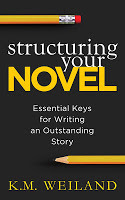 I’m sometimes asked which is more important: plot or character. This is a misleading question, at its foundation. Not only are plot and character equally important, they’re also interdependent upon one another. The term “structure” has become almost synonymous with “plot.” But the truth is this: structure is as much about planning your main character’s arc as it is crafting a solid beginning, middle, and end. In my book
Structuring Your Novel: Essential Keys for Writing an Outstanding Story
, I talk about the structure of plot, but today, let’s take a peek at the structure of character.
I’m sometimes asked which is more important: plot or character. This is a misleading question, at its foundation. Not only are plot and character equally important, they’re also interdependent upon one another. The term “structure” has become almost synonymous with “plot.” But the truth is this: structure is as much about planning your main character’s arc as it is crafting a solid beginning, middle, and end. In my book
Structuring Your Novel: Essential Keys for Writing an Outstanding Story
, I talk about the structure of plot, but today, let’s take a peek at the structure of character.1. Your Character’s Arc in the Hook: The beginning of your story is where you must not only hook readers with an interesting premise and plot development—but also with the protagonist’s fundamental dramatic problem. You will be introducing your character’s personality and “normal world” via a characteristic moment. This normal world and your character’s mindset within it will be defined by the Lie He Believes.
This Lie will be holding him back from the Thing He Needs (e.g., he may need love and acceptance, but believe he is unworthy of it). This conflict will define the entire course of your character’s arc. You will also be introducing your character’s overall story goal via the Thing He Wants Most—which will either be inhibiting him from gaining the Thing He Needs or will be impossible to gain until he rejects the Lie.
2. Your Character’s Arc in the First Act: The First Act (which encompasses roughly the first quarter of your story) will be all about reinforcing your character’s belief in the Lie. You will also want to indicate that the character has the potential for enough personal growth to eventually overcome that Lie.
3. Your Character’s Arc in the First Major Plot Point: As the First Act comes to an end and your narrative approaches the First Major Plot Point, your character will still be deeply entrenched in the Lie. But he will be in the beginning stages of rebelling against its foundation. His belief in how he serves the Lie will begin to evolve (e.g., he will still believe he is unworthy of love, but he may determine to do something to at least be worthy of respect). Then the First Major Plot Point will hit, changing your character’s normal world forever and giving him just a glimpse of what life might be like without the Lie.
4. Your Character’s Arc in the First Half of the Second Act: This section (which generally spans from the quarter mark to the halfway mark) is all about your character’s reactions to the First Major Plot Point. During this time, you will lay the first stone in the protagonist’s ability to defeat the Lie (often, this will come in the form of another character’s “mentoring”). The character will be getting closer to the Thing He Wants (although he may not realize it), even as he gets farther away from the Thing He Needs.
5. Your Character’s Arc in the Midpoint: The Midpoint will present another dramatic incident, this time forcing your character to abandon his reactions and begin a series of strong actions in an attempt to gain the Thing He Wants Most. The Midpoint will prompt the character to move away from the effects of the Lie, if not yet the Lie itself.
6. Your Character’s Arc in the Second Half of the Second Act: Thanks to the lessons learned in the First Half of the Second Act, the character will now be able to act in ways he wouldn’t have been able to in the First Half. For the first time, he will begin to move away from the effects of the Lie and toward the Thing He Needs, even though that may ultimately mean moving away from the Thing He Wants Most.
Toward the end of the Second Act, the character will be close to getting the Thing He Wants Most. But he will be conflicted, since claiming the Thing He Wants Most will mean putting himself entirely under the power of the Lie once again. His inner conflict will ramp up as he convinces himself his inner need is not an obstacle to his outer want.
7. Your Character’s Arc in the Third Major Plot Point: The Third Plot Point will once again be an event that changes everything for your character. This time, that event will be a point of crisis within your character’s arc. The Thing He Wants will now be within his reach, but to gain it, he will have to totally sacrifice the Thing He Needs. That’s where the Third Plot Point comes into play: something must happen to force him to realize he can’t surrender the Thing He Needs. At this point, he can no longer hide himself from the horror of the Lie. He must wrench himself into action by rejecting the Thing He Wants Most. In a sense, this action signifies the character’s dying to his old self.
8. Your Character’s Arc in the Third Act: Immediately, after the Third Plot Point, your character will find himself at a low point—either physically, emotionally, or both—as he realizes how much he lost when he rejected the Thing He Wants Most. The character must choose between surrendering to his pain and continuing the fight. This is the moment in which the character will be remade. This is where his new self will begin to rise.
The character must realize that the price he paid to gain the Thing He Needs was worth the pain. At this point in the story, he will have recognized the Lie, but he will not yet have completely forsaken it. The Third Act is about helping him grow into his new paradigm.
Throughout the Third Act, your character’s belief in his new paradigm will be under siege. As the Climax approaches (roundabout the 90% mark), this attack will intensify. This attack may come from the main antagonist, a minor antagonist, an ally, or the protagonist himself. The Lie will be flung into the character’s face, and he will totter as his weak point is punched. The greater the character’s peril of relapsing, the higher the tension. He will be off-balance and unhappy as he doubts whether he made the right choices earlier. His doubt is a sign he hasn’t completely overcome the Lie.
9. Your Character’s Arc in the Climax: The Climax begins as the character finally and fully rejects the Lie and acts upon his new Truth. In the climactic moment, he will use this Truth to conclusively destroy the antagonistic force. If appropriate, he may yet gain the Thing He Wants Most as well.
10. Your Character’s Arc in the Resolution: The Resolution will provide an illustration of the character’s new life, free from the Lie.
Once you understand how the structure of both plot and character work together to create a seamless, powerful story, you can use these basic tenets to raise your stories to the next level.

K.M. Weiland is the author of the epic fantasy
Dreamlander, the historical western A Man Called
Outlaw and the
medieval epic Behold the Dawn. She enjoys mentoring other
authors through her website Helping Writers Become Authors, her books Outlining Your
Novel and Structuring YourNovel, and her
instructional CD Conquering
Writer’s Block and Summoning Inspiration. She makes her home in western Nebraska.
Published on August 18, 2013 21:01
August 17, 2013
Twitterific

by Elizabeth S. Craig, @elizabethscraig
Twitterific links are fed into the Writer’s Knowledge Base search engine (developed by writer and software engineer Mike Fleming)
which has over 23,000 free articles on writing related topics. It's the search
engine for writers.
Sign up for our free newsletter for bimonthly writing tips and interviews with top
contributors to the WKB or like us on Facebook.
Mike Fleming and writing coach James Scott Bell are
offering an online, interactive, writing program to help make your next novel
great. It's called "Knockout Novel" and you can learn more about it
at Knockout Novel.com.
And...I have a new release! Death at a Drop-In , a Myrtle Clover mystery, released last week.
The Alphabet in Crime Fiction: Scissors
and Other Sharp Objects: http://dld.bz/cMxJN
@mkinberg
Using Android's Contacts to Store
Character Information: http://dld.bz/cMA3X
@clarissadraper
Common Style Issues for Writers: http://dld.bz/cMAKW @DianeKrause2
The 4 Cornerstones of Strong Characters: http://dld.bz/cMRmN @writingeekery
Are you marketing to readers or writers?
A reminder to 'platform-out': http://dld.bz/cMRuq
@Porter_Anderson @petermccarthy
The Readers Sound Off! How They Read,
What They Like and Where They Find Us: http://dld.bz/cMpGT
@marieforce
Be Consistent With Your Book and Your
Promo Plan: http://dld.bz/cMpHC
@behlerpublish
George R.R. Martin: The Real Iron Throne
& Boycotting Orson Scott Card: http://dld.bz/cMpHJ
@woodwardkaren
How to Evaluate Your Chapter Summaries
Prior to Writing Your Book: http://dld.bz/cMpHR
@ninaamir
Crime fiction--when detectives must
travel to solve a case: http://dld.bz/cMAuC
@mkinberg
Light a Fire Under Your Characters: http://dld.bz/cMpHT @noveleditor
4 Keys to Finding Time For Your Creative
Work: http://dld.bz/cMpHW @susankayequinn
The Most Important Kind of Edit a Book
Needs: http://dld.bz/cMpJc @jodyhedlund
Crafting the Nonfiction Book Cover: http://dld.bz/cMpTG @DebraEve @SusanShankin
How to Sell Ebooks: 5 Proven Tips: http://dld.bz/cMpUh @robeagar @DigiBookWorld
3 of Michael Connelly's Favorite Bits of
Writing Advice: http://dld.bz/cMpU4
@writersdigest
Why 1 writer lawyered up against fan fic:
http://dld.bz/cMpUA @tobywneal
@PassiveVoiceBlg
Amazon Patents 'DVD Extras' for E-Books: http://dld.bz/cMpVN @strngwys
The Business of Screenwriting: Writing
Credits: http://dld.bz/cMpYj @gointothestory
How to stay motivated (podcast): http://dld.bz/cMpYt @chase_reeves
5 Stimulating Ideas to Spark Your
Creative Juices: http://dld.bz/cMpY4
@lizstrauss
The Brief Zine-Publishing Career of Mo
Willems: http://dld.bz/cMpY7 @jasonboog
@The_Pigeon
Getting to know readers: the new
accessibility: http://dld.bz/cMpYB @tobywneal
101+ Descriptive Words For Foods: http://dld.bz/cMpYU @kathytemean
When is it okay to stop reading a book? http://dld.bz/cMpZz @iainbroome
Why Self-Publishing Doesn't Work – And
How It Can: http://dld.bz/cMpZC @yeomanis
Using the Subtext of Body Language in
Storytelling: http://dld.bz/cMpZW
@AlienNextDoor
Where to begin your story: http://dld.bz/cM2hd @KMWeiland
Describe with Telling Details—Character: http://dld.bz/cM2h4 @ava_jae
Streamline Your Writing: Cut Out
"That": http://dld.bz/cM2hH
@lindasclare
5 Quick Fixes for a Story that Goes
Wrong: http://dld.bz/cM2hP @yeomanis
@writeitsideways
Lack of Support For Your Creative Work: http://dld.bz/cM2hU @susankayequinn
Fixing info dump dialogue: http://dld.bz/cM2hX @JordanMcCollum
The Evolution of Process: http://dld.bz/cM2jd @Marie_Lu
Why We Should Read Introductions at the
End of the Book: http://dld.bz/cM2js
@galleycat
Strategies to work around Twitter's
follower ceiling: http://dld.bz/cM2jy
@stevebuttry
Should we let a group reprint our blog
posts to help promote an e-book? http://dld.bz/cM2jD
@michellerafter
Writing as Compulsion: http://dld.bz/cM2jT @womenwriters @janmerry607
What Gets Preserved? http://dld.bz/cM6he @amazingstories0
Unpacking Bowker's new market research
("the ebook is here to stay") : http://dld.bz/cM6j2
@Porter_Anderson @Bowker
Does Twitter Make Sense for Most Writers?
http://dld.bz/cM6mn @JaneFriedman
Facebook Graph Search Advice for Writers:
http://dld.bz/cM6mp @jasonboog
Organization: Tips for Dealing with
Overwhelm: http://dld.bz/cM6mH @GeneLempp
How To Get a Book Published: A
Step-by-Step Guide: http://dld.bz/cM6mX
@annerallen
Scams in Writing Contests: http://dld.bz/cM6nb @susanspann
How to write realistic dialogue using
subtexting (scroll down for post): http://dld.bz/cM6nW
@Brandilyn
How to Include the Five Senses Without
Falling into the Telling Trap: http://dld.bz/cM6pf
@MarcyKennedy @Janice_Hardy
A Pantser's Guide to Beat Sheets: http://dld.bz/cM6p4 @jamigold
Writing Outside Your Comfort Zone: http://dld.bz/cM6pD @diymfa @wendyluwrites
7 Ways to Write Better Blog Posts: http://dld.bz/cM6pE @aliventures
Hidden In Front Of Everyone's Eyes – Our
Own Potential: http://dld.bz/cM6pQ @danblank
Hell With What Sells: http://dld.bz/cM6pX @chuckwendig (lang)
Great Character: Neytiri
("Avatar"): http://dld.bz/cM8ad
@gointothestory
Michael Connelly on the No. 1 Key to
Writing a Series: http://dld.bz/cM8an
@writersdigest
5 Successful Marketing Strategies For
Fiction Authors: http://dld.bz/cM6ex
@thecreativepenn @passivevoiceblg
How Do You Balance Work and Writing? http://dld.bz/cM8gN @LAMysteryWriter
Taxes 101 for Authors: http://dld.bz/cM8gT @susanspann
Bowker on who buys what: http://dld.bz/cM8hs @Porter_Anderson @Bowker
They Don't Buy Your Book because it's
Good: http://dld.bz/cM8xW @junglereds @PJNunn
3 Ways to Fill an Empty Bio: http://dld.bz/cM8yF @lydia_sharp
Why people stop reading books: http://dld.bz/cM8yH @speechwriterguy
Low cost options for getting editing help
if you can't afford an editor: http://dld.bz/cM8zc
@nailyournovel
How to Write a Novel Readers Won't Put
Down: http://dld.bz/cM8zm @jamesscottbell
Crowdsourced Editing: The Future of
Self-Publishing? http://dld.bz/cM8zp
@nickthacker @KMWeiland
The Easiest Way to Make FaceBook Timeline
Cover Photos: http://dld.bz/cM8zQ
@lifehackorg
Making a book trailer--tools and tips: http://dld.bz/cM82j
A Writer's Magic Bakery: Selling your
short stories again (and again, and again…): http://dld.bz/cM82r
@smithwritr
A look at the New Adult genre: http://dld.bz/cM82x
Writerisms Ten: http://dld.bz/cM82B
The Pixar Theory: http://dld.bz/cM82J @JonNegroni
10 Scariest Monsters in Children's
Stories: http://dld.bz/cM83m @SmashingLists
Too many characters in a novel? One
solution: http://dld.bz/cMA5k @medwardsbooks
"Agent-Assisted Publishing": An
Interrupted Debate: http://dld.bz/cMA5n
@Porter_Anderson
Elizabeth George's Writing Process: From
Idea to First Draft: http://dld.bz/cMA5x
Indiana Jones and the Great Test of
Character: http://dld.bz/cMA5T @fictorians
Polishing your manuscript...1 writer's
suggestions: http://dld.bz/cMA6j @j_sandford
@authorterryo
Why 1 agent rejects manuscripts: http://dld.bz/cMA6u @rachellegardner
Be Clever to Be Riveting: http://dld.bz/cMA64 @livewritethrive
The Hazards Of Reading Our Old
Manuscripts: http://dld.bz/cMA85
What Makes Beautiful Writing Beautiful? http://dld.bz/cMA88 @joebunting
Writing satisfying endings: http://dld.bz/cMA8A
Story Maps: http://dld.bz/cMA8C
@shalvatzis
How Star Trek Helps Us with Showing
Rather than Telling: http://dld.bz/cMA8T
@MarcyKennedy
Market to Readers, Not Writers: http://dld.bz/cMA9w @LissyWrites
The Fifty Shades of Grey Effect: http://dld.bz/cMA9A @JanetKGrant
What Is a "Literary Change
Agent"? And What's Ethical? http://dld.bz/cMA9E
@Porter_Anderson
When authors spam: http://dld.bz/cMA9Q @EdieMelson
A Character's Mental State: http://dld.bz/cMA9W @ingridsundberg
Write With Confidence: http://dld.bz/cMCwj
Create a major direction list for your
writing and life goals: http://dld.bz/cMCwu
@TiceWrites
A Beginning Meditation Guide for Writers:
http://dld.bz/cMCw2 @ollinmorales
Suspect your category, but know your
story: http://dld.bz/cMCwA @byobrooks
The Essence of Storytelling: http://dld.bz/cMCxc
Starting freelance writing? The first 5
things you need to do: http://dld.bz/cMCxk
Are Your ISBNs Legit? http://dld.bz/cMCxz @mybookshepherd
How to Write about a Time of
Anticipation: http://dld.bz/cMCx2 @joebunting
How to Punctuate Descriptions of Colors: http://dld.bz/cMCx4 @writing_tips
Where 1 writer gets her ideas: http://dld.bz/cMCx8 @tobywneal
Covers that Wow: http://dld.bz/cMCx9 @MariaZannini
How To Start Writing That Next Book and
Not Lose The Excitement: http://dld.bz/cMCxM
@cleemckenzie
The wow factor: http://dld.bz/cMCy5
Do You Need a Literary Executor? http://dld.bz/cMCyC @susanspann
Is It Fair Use? 7 Questions to Ask Before
Using Copyrighted Material: http://dld.bz/cMCyW
@janefriedman
How to Edit in Passes: http://dld.bz/cMCzb @ava_jae
Is Modern Poetry Too Complicated For
Modern Readers? http://dld.bz/cMC2X
Avoiding perfectionism: http://dld.bz/cMC2Z @brandenbarnett
Why computer games aren't like novels —
but should interest novelists anyway: http://dld.bz/cMC3n
Screwing Up On Purpose: The Beauty of The
Deliberate Mistake: http://dld.bz/cMC3t
@jmcaddell
The link between depression and
creativity, and how it can be good for you: http://dld.bz/cMC32
@tannerc
6 Popular Tumblrs That Landed Book Deals:
http://dld.bz/cMC35
Self publishing and perpetual editing: http://dld.bz/cMC3D @JordanMcCollum
Organizing screenwriting projects: http://dld.bz/cMCSy @scriptmag @jeannevb
How Scholastic Sells Literacy To
Generations Of New Readers: http://dld.bz/cMCS9
@npr
Why Barnes & Noble Is Good for
Amazon: http://dld.bz/cMCSQ @carr2n
@passivevoiceblg
7 Essential Online Book Marketing Tips
from the Front Lines: http://dld.bz/cMCSS
@ticewrites
How To Email Your List: http://dld.bz/cMCSX
10 Things to Remember When Writing a
Legal Thriller: http://dld.bz/cMCTc
@writersdigest @ZacharyPetit
63 Character Emotions to Explore: http://dld.bz/cMCTj @fictionnotes
42 Writing Tips From J.A. Konrath: http://dld.bz/cMCTu @JAKonrath
7 Horrifying Ailments Named After
Literary Characters: http://dld.bz/cMCTS
@kimber_regator
A Perfect Plot In 6 Easy Steps: http://dld.bz/cMCTY @woodwardkaren
9 Inspirational Bits of Advice From Anne
Rice, Catherine Coulter, David Morrell and Others: http://dld.bz/cMCUg
@writersdigest @ZacharyPetit
22 Rules of Storytelling: http://dld.bz/cMCU8
Bringing Personal Experience Into Your
Writing: http://dld.bz/cMCUT @timscribe
@thecreativepenn
The Oxford comma: http://dld.bz/cMCVb
25 Things To Know About Your Story's
Stakes: http://dld.bz/cMCVh @chuckwendig
(lang)
Who Got Cultural Studies In My Fandom? http://dld.bz/cMCVp @amazingstories0
Death and writing--what's the connection?
http://dld.bz/cMCVM @BTMargins
@LaurHarrington
On writing better endings: http://dld.bz/cMRn2 @janelebak
Plotting and pantsing...either will work:
http://dld.bz/cMRn4 @ca_london
Finding Time to Write: Old-School
Technology Saves the Day: http://dld.bz/cMRn6
@Christi_Craig
Kurt Vonnegut's 8 Rules for Writing
Fiction: http://dld.bz/cMRn8 @gretchenrubin
Increasing Your Email Subscribers: http://dld.bz/cMRnB @blogherald
There's only one requirement for being a
writer—do you meet it? http://dld.bz/cMRnF
@ava_jae
Pricing Low Vs. Pricing High: How Much
Should You Charge for Your Ebook? http://dld.bz/cMRnN
@freelanceswitch
All about advances: http://dld.bz/cMRqj @stevelaubeagent
A revealing
interview with writer Lee Child: http://dld.bz/cMREb
Published on August 17, 2013 21:01



